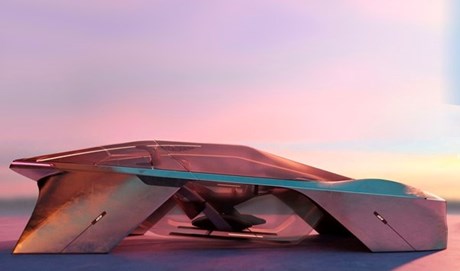
A GROUNDBREAKING COLLABORATION EXPLORING THE FUTURE OF SUSTAINABLE LUXURY
A GROUNDBREAKING COLLABORATION EXPLORING THE FUTURE OF SUSTAINABLE LUXURY
- Bentley Projects showcases the Royal College of Art’s students’ visions towards a more sustainable luxury automotive future
- Design concepts are centred around three particular areas
- The ‘made world’, based on materiality and the craft of making
- The ‘regenerative world’, focussed on sustainable futures via advanced new functions
- The ‘meaningful world’, which considers how digital aspects could be used for learning, design optimisation and deeper human connection
- The eight projects on display represents each of these themes
(Crewe, 23 November 2022) Bentley has worked with students on the Intelligent Mobility MA course at London’s Royal College of Art to create a collection of visionary design concepts for display in Germany and in Europe in early 2023.
The students’ designs were first shown as Bentley Projects at The Guggenheim Museum Bilbao in September, as part of Motion, Autos, Art, Architecture – an exhibition exploring the intersection of automobile design and art, curated by the Norman Foster Studio.
The designers of the future were invited to explore sustainable luxury and how future vehicles can be designed to adapt and evolve during their lifecycle to provide more sustainable, efficient and meaningful ways of co-existing with people. The objective was driven by Bentley’s 'Beyond100’ strategy – a holistic future vision to transition the Bentley brand.
Chairman and Chief Executive, Adrian Hallmark, embodied the vision of this strategy in his ambitious claim:
“Within a decade, Bentley will transform from a 100-year-old luxury car company to a new, sustainable, wholly ethical role model for luxury.”
Professor Dale Harrow, Chair of the Intelligent Mobility Design Centre and Head of Intelligent Mobility Design, Royal College of Art, said:
“We are at a turning point where the onset of autonomous vehicles must be balanced with sustainable materials and processes: students have developed a wide range of responses to this need in collaboration with Bentley who have supported them throughout the design process.”
Bentley challenged the students to create designs embodying cross-generational ownership, sustainable longevity and rebirth. The Intelligent Mobility Design students were asked to consider a number of questions.
- How can we understand sustainable design?
- How can we understand “the craft of making”?
- Why is provenance key?
- What is regenerative design?
- How can we use digital to enhance meaning?
The eight projects that were selected each proposed a radical new form for sustainable luxury mobility, through vehicles and systems designed to create a sense of belonging, respect and meaning for the owners of today and tomorrow.
The works on show reflected three interconnected spaces of research:
- How handmade processes reflect and capture the materiality, provenance and entropic processes of objects.
- How vehicle function and intelligence are expanding to include more sophisticated and integrated ways of behaving and being.
- How we can see digital tools and approaches as more connective and valuable methods to radically change the performance of our vehicles and reframe how we educate and connect people through mobility to places and place-making.
When asked ‘how can we understand sustainable design?’ - an experiential hierarchy was evolved - comprised of three integrated design spaces: the made world, the regenerative world, and the meaningful world.
The Made World
This theme was identified as the ‘craft of making’ with three sub-sections; handmade, provenance and entropy. When an object is handmade, deep material knowledge is gained and knowledge enables expression. From a sustainable perspective, provenance / authenticity was also identified and is epitomised by Vivienne Westwood’s quote: ‘Buy less. Choose well. Make it last’. The third sub-section, entropy, refers to the numbers of ways a system can change and a sensitivity and acceptance of the more transient, temporary and changing nature of designed artefacts.
Shoichi Sato’s entropic design, “Pace Layers” took inspiration from the levels within a building including foundations, structure, skin, services, internal space and contents. This concept was applied to a car, where in the future as parts of the car (system) become obsolete at different rates and can be intelligently replaced repeatedly or swapped, avoiding the redundancy and wastage in traditional vehicle lifecycles.
The Regenerative World
In the regenerative world, transparent function, environmental and biological impact was the basis of the design. Students choose then to focus upon passenger or environment centred concepts – for example, does the car provide space for the passengers to think, work, sleep or learn and can the car also regenerate the environment; providing power for others, cleaning the environment and fulfilling a wider range of novel, environment ecosystem functions.
Ben Martin’s “Carbon Capture Experience” design filters the air that moves around the car as occupants make their journey improving the air quality and the environment. The vehicle also proposes the use of semi-transparent biopolymers to enable an accessible visual experience of this new form of functionality.
A Meaningful World
The meaningful world considered how digital tools could be used to enhance the interaction with a car. The digital tools could be used to connect, learn and optimise the owner’s experience.
Naomi Saka’s design – The Bentley Spark – drives digital research toward deeper interaction. Proposing that future owners will seek greater interaction with their products through an environment that is flexible and evolves with them. Taking inspiration from nature, Naomi believes an authentic language for an empathic environment could be recreated in a car – building a new adaptive aesthetic language which stems from the form and movement of natural biological systems and organisms. Through this approach, she suggests a car could recognise special occasions, greeting the occupants in ways which are dynamic, connective and unique.
New Narratives
In the World Economic Forum in March 2022, it was recognised that ‘Generation Z cares more about sustainability than anyone else, and it is starting to make others feel the same’. Changing mind-set is the most powerful way to influence and gain action toward a regenerative future - delivered through design collaboration and vision as part of progressive brand strategy.
- ENDS -

































